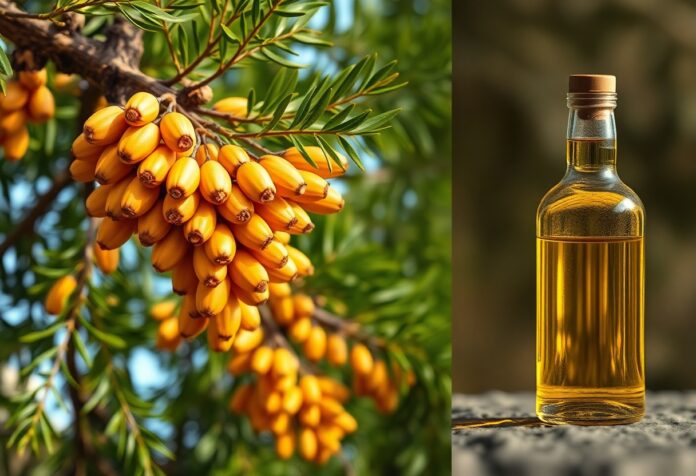This exploration researchs into the intricate interactions between the lipid profile of argan oil and your hair follicle regeneration. You may wonder how this natural oil, laden with beneficial fatty acids and antioxidants, influences your hair health. Through understanding the science behind its components, you can discover practical ways to harness argan oil for potential revitalization of your hair. Join us in this investigation to uncover how integrating this remarkable oil into your routine may empower your hair follicles and enhance your overall hair vitality.
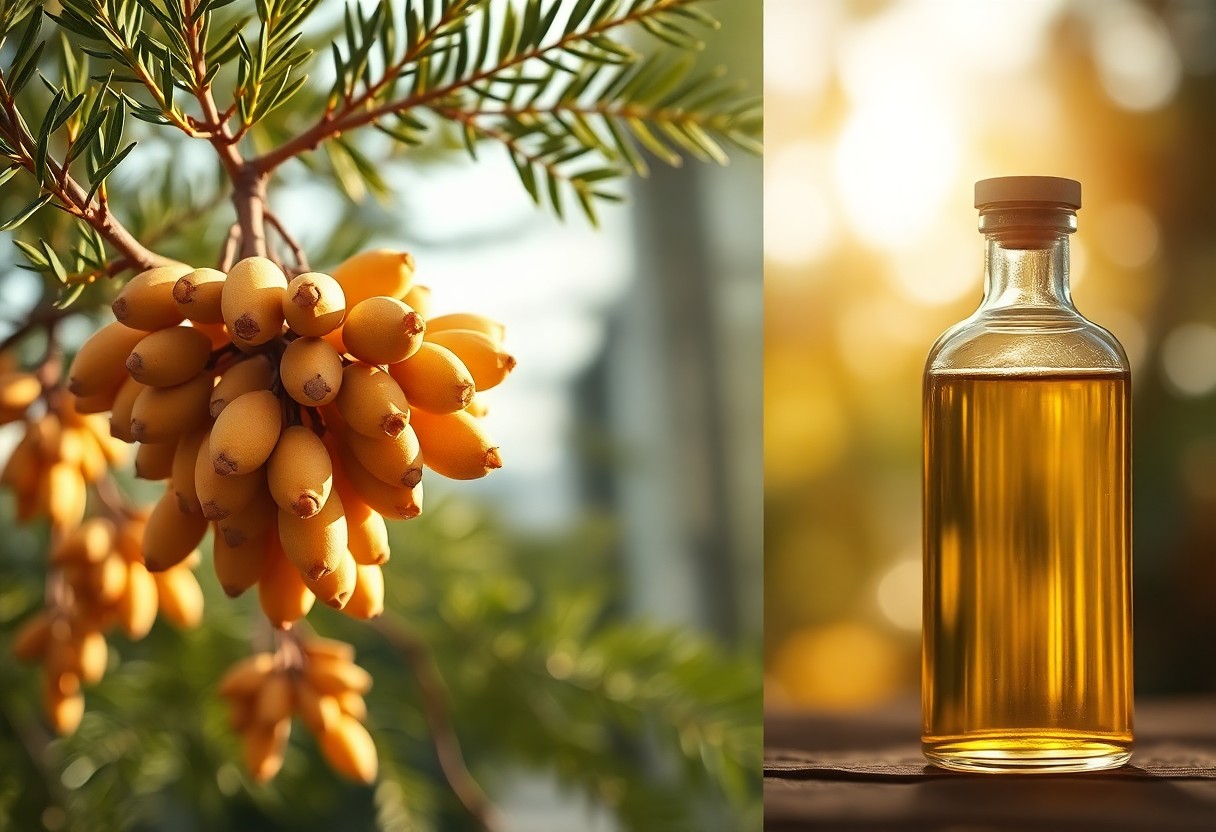
Key Takeaways:
- Lipid Profile: Argan oil is rich in imperative fatty acids, particularly oleic and linoleic acid, which can support hair heath and potentially enhance hair follicle regeneration.
- Antioxidant Properties: The presence of antioxidants in argan oil may help combat oxidative stress in hair follicles, promoting healthier hair growth.
- Moisturization: Argan oil is known for its excellent moisturizing properties, which can improve scalp health and create a conducive environment for hair follicle regeneration.
- Anti-inflammatory Effects: The anti-inflammatory properties of argan oil may reduce scalp inflammation, helping to maintain healthy follicles and promote hair growth.
- Ease of Use: Argan oil can be applied topically or incorporated into hair care products, making it an accessible option for those seeking to enhance hair health.
How to Understand the Lipid Profile of Argan Oil
Before delving into the benefits of argan oil for hair follicle regeneration, you must first understand its lipid profile, which is a complex blend of various fatty acids and compounds. This knowledge is important in determining how these components interact with your hair and scalp health. By analyzing the degrees of saturation and unsaturation within the lipid profile, you can uncover how these molecules enhance hydration, support cellular regeneration, and protect your hair from damage. As you explore this oil’s properties, you may find that its botanical origins serve as a guide to its functional capabilities.
Identifying Key Components
Profile analysis of argan oil reveals its rich content of pivotal components such as oleic acid, linoleic acid, and palmitic acid. Oleic acid, in particular, plays a significant role in moisturizing and penetrating hair strands, allowing for improved elasticity and reduced breakage. Meanwhile, linoleic acid is known for its anti-inflammatory properties, which can foster a healthier scalp environment—vital for optimal hair growth. By recognizing these key fatty acids, you can better grasp how argan oil operates on both macroscopic and microscopic levels, thereby enhancing your approach to hair care.
Assessing Nutritional Benefits
Even as you examine the nutritional benefits of argan oil, it becomes evident that the balance of fatty acids enhances not only hair vitality but also overall scalp health. The presence of antioxidants and vitamins—such as vitamin E—complements the fatty acid profile by combating oxidative stress and promoting enhanced follicle function. In addition, the anti-inflammatory properties offer relief from conditions that can inhibit hair growth, like dermatitis or scalp sensitivity. This understanding equips you to leverage argan oil as more than a superficial treatment, but as an important component of your broader hair health regimen.
Another aspect to consider when evaluating the nutritional benefits is how argan oil can work synergistically with other hair care ingredients, amplifying their effects. By integrating argan oil into your routine, you may find that it not only provides nourishment on its own but also enhances the absorption and efficacy of other active compounds, leading to a more comprehensive regimen for maintaining and improving your hair and scalp condition. This holistic approach will empower you to achieve optimal hair health through informed choices driven by an understanding of nutritional science.
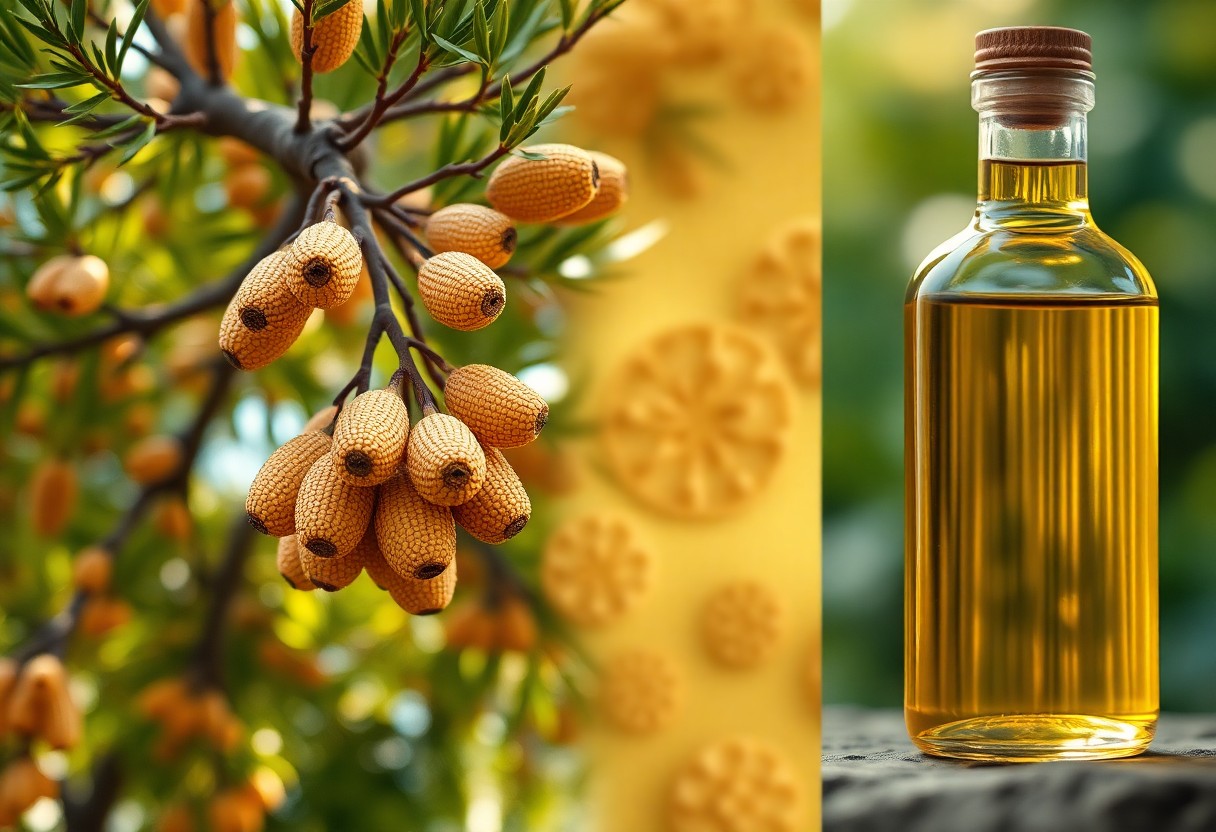
How To Apply Argan Oil for Hair Care
Now that you are aware of the potential benefits of argan oil for your hair, it is imperative to understand how to apply it effectively. You should start by selecting high-quality, pure argan oil, which can be found in various formulations. The oil can be applied directly to your scalp and hair, or you can mix it with your favorite conditioner or hair mask. A recent study on the effects of lipids on hair health noted that certain extracted lipids can promote hair growth and prevent loss, as detailed in the study on Schizochytrium sp. Extracted Lipids Prevent Alopecia by …. This hints at how imperative it is to nourish your hair from the roots. Start with a small amount—about a teaspoon—and gently massage it into your scalp, allowing it to stimulate circulation and promote healthy hair growth.
Methods of Application
While applying argan oil, it is beneficial to focus on both your scalp and the lengths of your hair. For scalp application, section your hair to ensure even distribution, using your fingertips to massage the oil into your skin. This not only hydrates but also enhances blood flow to the follicles. For the lengths of your hair, applying argan oil helps in sealing moisture and reducing frizz, providing instant shine and smoothness. You might also consider using a little argan oil as a finishing touch after styling, which can help tame flyaways for a polished look.
Frequency and Duration of Use
The frequency of argan oil application can influence its effectiveness in revitalizing your hair. For optimal results, consider applying argan oil at least 1-2 times per week to maintain your hair’s health and resilience. You may increase the frequency if your hair is particularly dry or damaged, as this may help enhance hydration and strength over time. Additionally, allowing the oil to sit on your scalp and hair for hours or even overnight can deepen its nourishing effects, making your hair feel softer and healthier.
To maximize the benefits of argan oil, you can also incorporate it into your hair care routine after washing your hair. Applying it to damp hair allows for better absorption, ensuring that the moisture penetrates effectively. For those with oily hair types, using argan oil sparingly can provide the necessary nourishment without weighing your hair down. Ultimately, tailoring the frequency and method of application to your specific hair needs will yield the most satisfying results.
Tips for Enhancing Hair Follicle Regeneration
To encourage hair follicle regeneration, you may want to adopt several beneficial practices. Incorporating argan oil into your hair care routine is recommended, as it provides imperative fatty acids and antioxidants that can improve overall hair health. Additionally, consider the following tips:
- Maintain a balanced diet rich in vitamins and minerals.
- Stay hydrated to support cellular health.
- Engage in regular scalp massages to stimulate blood flow.
- Limit heat styling and harsh chemical treatments.
The combination of these practices can create a favorable environment for your hair follicles to flourish. For further insights into argan oil’s potential benefits, consult the article Does Argan Oil Help Protect Against Hair Loss?.
Dietary Considerations
Some foods can significantly impact your hair health, so it’s vital to focus on a nutrient-dense diet. Incorporating omega-3 fatty acids, found in fish or flaxseeds, can help promote healthy hair growth. Furthermore, antioxidants such as those present in fruits and vegetables protect your hair follicles from oxidative damage, potentially enhancing regeneration.
Your diet should also include protein, as hair is primarily composed of keratin, a protein that requires adequate building blocks for optimal growth. Foods like lean meats, eggs, and legumes can contribute to stronger hair. By attending to these dietary considerations, you create a nurturing framework for your hair to thrive.
Complementary Hair Care Products
Any supportive products you use on your hair can also play an imperative role in fostering follicle regeneration. Aligning your choice of shampoo and conditioner to contain natural ingredients can enhance the potency of argan oil. Look for formulations that are free from sulfates and parabens, as these can strip your hair of its natural properties and hinder growth.
Another strategy is to explore hair masks and treatments specifically designed for hair thickness and hydration. These can complement the nourishing effects of argan oil, amplifying its benefits. You might also consider incorporating serums that contain biotin or vitamin E, both known for promoting thicker, healthier-looking hair.
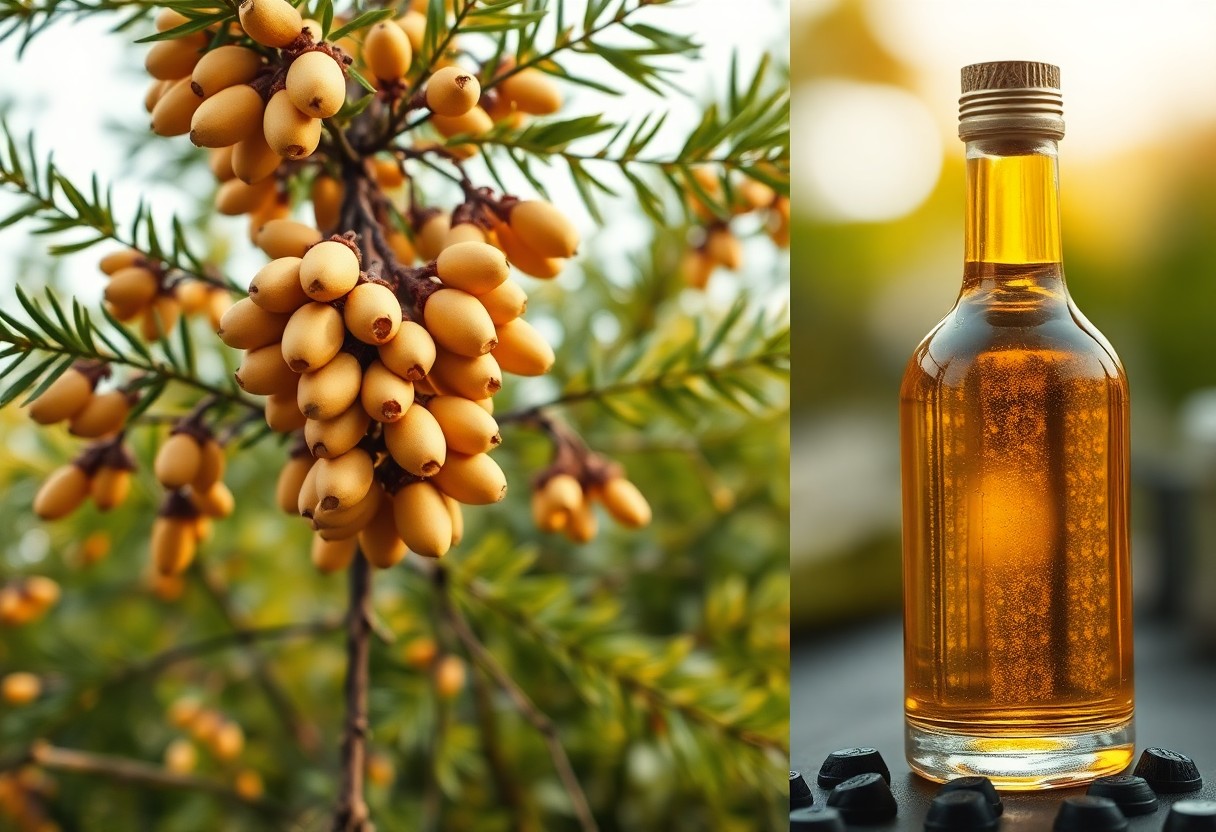
Factors Influencing Hair Follicle Health
For anyone eager to maintain healthy hair follicles, various factors contribute significantly to this endeavor. These core elements work in synergy to influence the overall condition of your hair:
- Genetic predispositions
- Environmental impacts
- Hormonal balances
- Diet and nutrition
- Stress levels
To investigate deeper into the benefits of one particular oil that has garnered attention in the discourse of hair health, you may want to explore Argan Oil: Health Benefits, Nutrition, and Uses. Thou shall launch on an enlightening journey once you grasp these interconnected relationships among various aspects affecting hair follicles.
Genetic Predispositions
Genetic factors play an undeniable role in determining the health of your hair follicles. These inherited characteristics not only shape the texture and color of your hair but also influence their growth rates and structural integrity. If your family has a history of hair loss, it’s possible that you may be genetically predisposed to similar outcomes. This inherited condition often manifests in a specific pattern, particularly in androgenetic alopecia, which is known to affect both men and women differently.
Moreover, different ethnic backgrounds bring unique genetic codes that can affect hair follicle density and growth cycles. Understanding your genetic composition can empower you to make informed choices about treatments and products aimed at enhancing your hair’s vitality and longevity. By recognizing these genetic factors, you can better tailor your regimen to promote optimal hair health.
Environmental Impacts
Factors in your surrounding environment can directly affect hair follicle health and their regeneration processes. Pollution, UV radiation, and extreme weather conditions wreak havoc on hair and scalp, stripping them of natural oils and moisture. The exposure to harmful chemicals, found in many hair care products, can also damage your follicles over time, leading to reduced hair growth.
Understanding the impact of environmental elements can help you strategize better protection for your hair. Simple changes like wearing a hat in strong sunlight, using quality skincare products, or employing leave-in conditioners can shield your hair from adverse effects. Every measure you take counts toward maintaining the vitality and health of your hair follicles, ensuring their regeneration remains strong and unyielding.
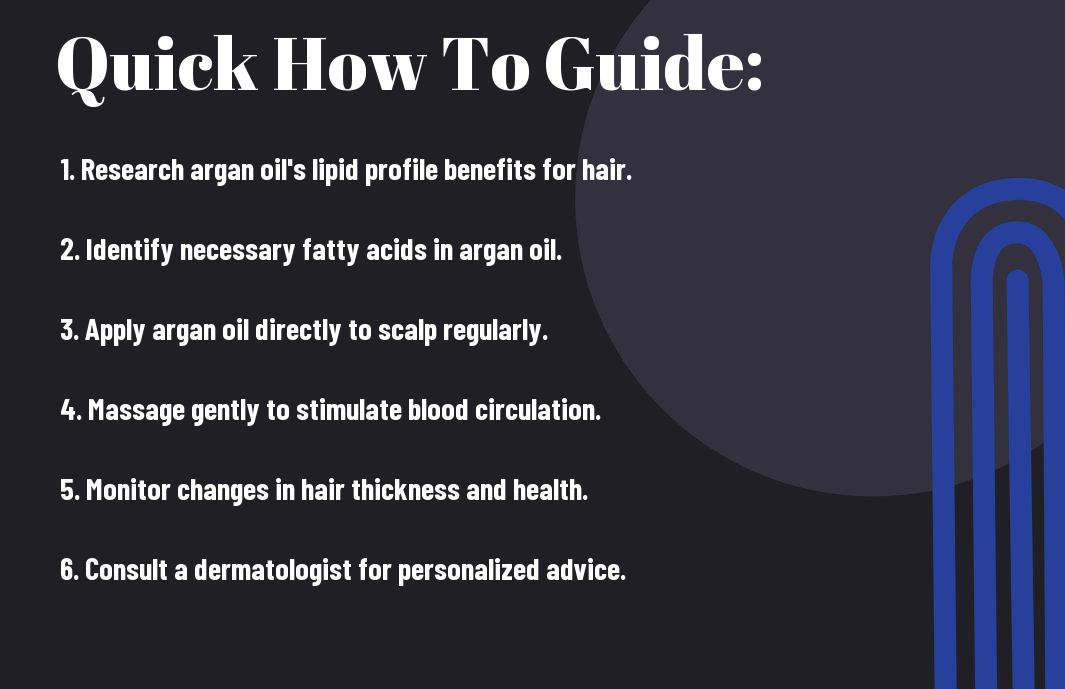
Conclusion
The exploration into the lipid profile of argan oil suggests it possesses unique properties that could positively impact hair follicle regeneration. As you explore into the myriad of components in argan oil, including vital fatty acids and antioxidants, you may find that these elements work synergistically to promote healthier hair. The monounsaturated fats, particularly oleic and linoleic acids, may serve to nourish and rejuvenate your scalp, fostering an environment conducive to hair health. Engaging with this natural remedy could lead to a more profound understanding of the intersection between nutrition and biology in relation to your hair’s vitality.
The quest for enhanced hair follicle regeneration through the application of argan oil serves as an example of how simple ingredients from nature can hold the potential to enrich your well-being. By integrating argan oil into your hair care routine, you may inadvertently be participating in a scientific discourse that bridges the gap between health and natural remedies. You hold the power to experiment with these insights, taking control of your hair’s fate, while observing the beautiful intricacies that connect science and the mechanics of nature. The journey may not only lead to aesthetic benefits but also a deeper appreciation of the complexities existing within biology.
FAQ
Q: What is a lipid profile, and how does it relate to argan oil?
A: The lipid profile refers to the representation of various types of fats and fat-like substances found in a particular oil, including fatty acids and sterols. In the case of argan oil, it is rich in oleic acid and linoleic acid, which are known to nourish hair and scalp. The lipid components of argan oil can penetrate hair follicles, potentially promoting healthy hair growth and regeneration.
Q: Can argan oil improve the health of hair follicles?
A: Yes, argan oil is known to enhance hair health due to its high content of antioxidants, vitamins, and crucial fatty acids. These nutrients can help to strengthen hair strands, moisturize the scalp, and reduce inflammation, all of which are vital for maintaining healthy hair follicles. The improved condition of hair follicles may lead to better hair growth and regeneration over time.
Q: How often should argan oil be applied for optimal results on hair?
A: For best results, argan oil can be applied to the hair and scalp 2-3 times a week. It can be used as a pre-shampoo treatment, a leave-in conditioner, or incorporated into hair styling products. Consistent application helps ensure that the beneficial properties of argan oil have a lasting effect on hair follicle health and regeneration.
Q: Are there any scientific studies supporting the use of argan oil for hair follicle regeneration?
A: While research specifically focused on argan oil and hair follicle regeneration is limited, studies on its individual components, such as fatty acids and antioxidants, demonstrate positive effects on hair health. These elements are known to promote cell regeneration, reduce oxidative stress on hair cells, and enhance overall scalp health, suggesting that argan oil may contribute to better hair growth and regeneration indirectly.
Q: Are there any potential side effects of using argan oil on hair?
A: Generally, argan oil is considered safe for most people when used topically. However, those with nut allergies should approach with caution, as argan oil is derived from the nuts of the argan tree. It’s always advisable to perform a patch test before use, especially if applying the oil to the scalp, to check for any adverse reactions. Overuse could potentially lead to a greasy residue on the hair if not applied in moderation.

